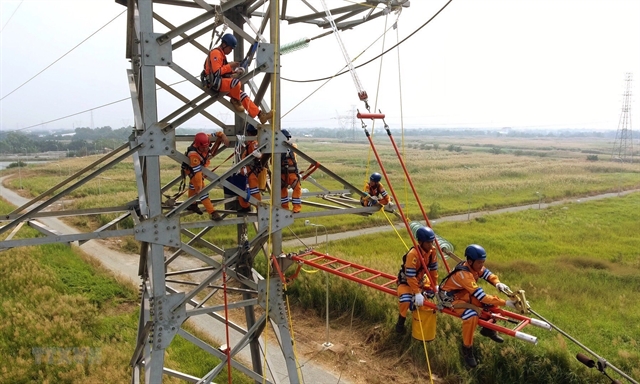Vietnam Electricity (EVN), the country's largest power company, has proposed a new price mechanism, one that is better tuned to input price fluctuations, for electricity.

Vietnam Electricity (EVN), the country's largest power company, has proposed a new price mechanism, one that is better tuned to input price fluctuations, for electricity.
According to EVN, electricity is similar to fuel and therefore, should be able to be adjusted when its input prices rise and fall.
Tran Dinh Nhan, EVN's director-general, said the company has been working around the clock to meet increased demand in post-pandemic economic recovery.
However, input prices such as fuel and coal have been skyrocketing during 2022, in several instances by up to 600 per cent in comparison to early 2021. Meanwhile, the electricity price has not been allowed to increase since 2019.
Nhan said it has resulted in EVN eventually being unable to finance its operations.
"There is a very real risk that EVN may not be able to pay our suppliers in a near future," he said.
A grim-looking balance sheet will likely degrade the company's financial rating, hindering its ability to secure loans for expansion projects, he added.
Nhan called for a new mechanism in which input prices are reflected in electricity prices.
In addition, he urged the government to grant EVN access to ODA funds and preferential lending to invest in key power projects, which are crucial to ensuring the country's energy security in the coming decades.
Earlier this month, at a conference held by the Ministry of Industry and Trade (MoIT), which oversees Viet Nam's power sector, deputy minister Do Thang Hai said his ministry had sent a proposal to the central government regarding a new method of pricing electricity.
He has not, however, been able to provide an exact date for when it could be implemented.
Viet Nam's electricity price has remained at VND1,864.44/kWh (VAT not included) on average since March 2019.
In an earlier development, EVN reported VND31 trillion (US$1.317 billion) in accumulated losses since fuel and coal prices spiked at the beginning of the year.
For example, Thermal Power Plant Thai Binh consumed on average 1.6 million cubic metres of coal every year. Of which, 30 per cent were imported at almost double the prices of domestic coal. The plant has been losing money since as early as February this year.
"We have been trying to use domestic coal as much as possible while reducing other operational costs," said Tran Trung Hoc, the plant's deputy director.
An MoIT report indicated EVN could face losses of up to VND65 trillion this year.
The company, for its part, has been actively seeking ways to cut expenses. However, there was a limit to how far it could go.
"We have been able to reduce our regular expenses by 10 per cent, repair and maintenance by 20-30 per cent on top of others to save nearly VND10 trillion," said EVN's deputy director Nguyen Xuan Nam.
"It was, however, the end of our limit. External factors such as rising input prices will keep us in the red this year," he said.
Another pressing concern, according to the company, was that sustained losses will prohibit EVN from investing in new projects and project expansions, especially in green energy. — VNS
- Tags
- EVN
- electricity prices





